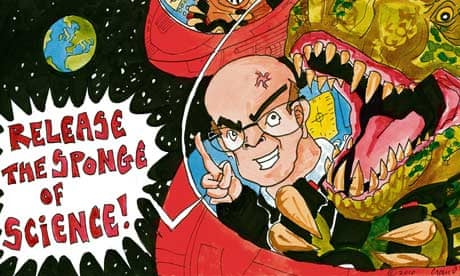Space and dinosaurs. That's what the new coalition government's science policymakers will be focusing on to get kids into science.
We've all been there. You're at the Natural History Museum trying to impress your girlfriend with your in-depth scientific knowledge. You confidently announce that the skeleton in front of you is "A Velociraptor, honey, like the ones off Jurassic Park".
It only takes a second to be upstaged by a five-year-old.
"I think you'll find it's Deinonychus, actually," announces the nearby child. "And they got it wrong in the films anyway, most of the dinosaurs were from the Cretaceous period not the Jurassic."
The kid gives you a withering look and walks off with your date.
The coalition government's minister for universities and science David Willetts says he understands those kids. Delivering his first major speech on science policy at the Royal Institution today, he said: "The two best ways of getting young people into science are space and dinosaurs. So that's what I intend to focus on."
At a press briefing before the speech, Willets said: "One of the contributions that we can make in my department to science and schools is the sheer excitement to kids getting interested in science." He said public engagement events like the Atlantis space shuttle astronauts' current UK tour were a great way to get young people hooked.
The question remains whether young people will get excited about science after a speech that favoured "hard-headed economic arguments" over blue-sky research.
"It seems to me that sometimes ... an appeal to a sort of chauvinist sense of Britain being first is not necessarily the argument that is most persuasive to ... work out whether public money should be spent," said Willetts. "What I personally find more persuasive is the argument – it's got a kind of clunky word, someone in this room will be able to think of a much better name for it – what is called 'absorptive capacity'."
Willetts said that Britain should have the capacity to absorb and learn from excellent science going on elsewhere in the world, even if "world-breaking science" wasn't generated here.
Britain currently carries out about 5% of the world's research, and scores well on measures of quality. "If you're doing your own cutting-edge research," said Willetts, "it does actually increase your capacity as well to benefit from cutting-edge research going on elsewhere."
So we need a better term for "absorptive capacity". Might I suggest The Science Sponge. It's cheap, it's effective and it certainly ain't clunky.
Here's how the Sponge works. The cutting edge research gets done by other nations, then Britain sponges off all their hard work to soak up the benefits. The Sponge also cleans up all those nasty research laboratories that cost so much money, leaving the economy squeaky clean. Genius.
Willetts said he didn't think the cuts in the school building programme would greatly affect the concentration of the next generation of scientists as they sit in their lessons.
"You can have inspiring science lessons in school buildings, even if they've been around for quite a while." Public engagement with science events were "as important for getting young people studying science as the exact age of the building in which the science lessons take place," he added.
Willetts viewed the upcoming Comprehensive Spending Review as an opportunity for a strategic approach to science spending.
"Rather than just kind of equal misery everywhere ... it may be better to get out of some activities altogether," he said. "But it's early days and those are decisions still to be taken."
He did have good news for budding mathematicians, however. "Virtually anything with maths in it is an incredibly good lifetime investment," he said.
So it remains to be seen which sciences the Sponge will clean up first.
Cian O'Luanaigh is a graphic artist and writer studying science communication at Imperial College London

Comments (…)
Sign in or create your Guardian account to join the discussion